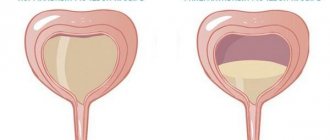Why does your body smell like urine?
Why in some cases does the smell appear from different parts of the body?
The exact cause can only be determined through medical diagnostics and detection of serious diseases. This phenomenon interferes with the normal life of a woman at any age and brings discomfort, so there is no point in delaying seeking help. Common causes of urine odor from a woman's body are:
- Hyperhidrosis of the third and fourth stages. Often, a severe form of this disease is accompanied by pathologies of the endocrine system and kidneys. They can provoke not just increased sweat production, but also the presence of urine odor in it.
- Lack of proper hygiene. Some women's living conditions do not allow them to take a shower every day, while others simply neglect the simple rules of regularly changing clothes and bed linen. As a result, bacteria settle on the body, and due to their activity, an unpleasant odor appears.
- Vaginal microflora disorders. There are many reasons for a malfunction: gynecological diseases, complications after childbirth, diseases of the genitourinary system (often due to age).
The smell of urine emanating from the whole body can appear for the same reasons as from the genitourinary organs. This is the frequent consumption of certain foods, alcohol, and the use of certain medications.
Analyzes
Tests and a comprehensive study will help determine the cause of the unpleasant odor in the urine.
- With deviations, urine usually changes its composition. White blood cells increase, and in severe inflammatory processes protein is detected.
- If kidney problems are serious or have prolonged inflammation, red blood cells are found in the urine. The red blood cells decompose, causing an intense foul odor.
- To detect problems and make a further diagnosis, it is enough to pass a general, biochemical and bacterial urine test. Based on the tests obtained, the doctor prescribes more in-depth studies.
Types of unpleasant odor
Normally, human urine does not have an amber; as it comes into contact with oxygen, urea oxidizes and an ammonia aroma appears.
There are different types of sharp unpleasant odor of urine in women:
- acetone;
- fecal;
- putrefactive;
- sweetish;
- sour;
- medicinal.
Very often, people feel that their urine smells after they have finished urinating. This indicates a problem with the enzymatic process.
Each of the above aromas is caused by certain disorders in the body. The stench of acetone indicates a metabolic disorder, ketonuria or diabetes mellitus (in this case, a sweetish aroma is also felt).
The unpleasant smell of acetone in urine during pregnancy is a very common occurrence; this is due to the restructuring of hormones and metabolic processes.
Fecal stench indicates the proliferation of pathogenic microflora, which spreads from the anus. The stench of rotting is a clear sign of inflammation of the bladder or the presence of pus in it (in this case, the urine has a viscous consistency and contains foreign secretions).
There are several types of odor that may be characteristic of women's urine:
- acetone;
- ammonia;
- sourish;
- fish;
- sweetish;
- mouse;
- smell of rotten eggs.
Urine removes metabolites of bacteria and viruses from the body. Own metabolic products also enter urine, which flows from the kidneys into the bladder, so sometimes you can suspect an illness just by sniffing the patient’s urine.
The causes of stench are varied. For example, when an adult’s urine smells like acetone, this is a clear sign of diabetes. Other possible causes of this condition include pregnancy, dehydration, or infections.
Treatment with antibacterial drugs can cause a side effect - a change in the smell of urine. Urine smells like medicine after Augmentin, Penicillin, Ampicillin and Ceftriaxone. A similar phenomenon is possible in those who take vitamins (B1, B6, B12).
Periods of hormonal fluctuations in adolescence, as well as in premenstrual days during menopause in women, can also be accompanied by a change in the smell of urine. At this time, due to the high (or, conversely, too low) content of biologically active substances in the blood, the liquid filtered by the kidneys acquires a sharp “aroma”.
Many people notice that men's urine has a special, more pronounced smell than women's. This is the norm. The phenomenon is associated with high levels of the hormone testosterone in the urine. But often the smell appears after drinking a large amount of alcohol, especially beer.
In what cases is the unpleasant odor of urine in women not caused by pathology?
A change in the smell of urine is not always associated with health problems. A woman may notice a strong aroma of urine in the following cases:
- Low fluid intake. If the body does not receive enough water, the urine becomes concentrated, and therefore smells more strongly of ammonia. You should drink at least 1.5-2 liters of liquid per day.
- Habit of tolerating the urge to urinate. The longer the urine is infused, the more pronounced its smell. It is enough to stop ignoring the body’s need to empty the bladder for the situation to return to normal.
- The presence of certain dishes in the diet. First of all, we are talking about asparagus, garlic, horseradish and any salty/spicy food that gives urine an ammonia smell. Soda with dyes, marmalade, and candies can cause a moldy aroma.
- Taking medications. Some antibiotics and vitamin B6 help change the aroma of urine.
The smell of urine that appears should bother a woman if the symptom is not caused by “safe” reasons, such as diet. It is advisable to consult a doctor and, if necessary, begin treatment immediately.
Changes in the properties of urine during pregnancy
The repulsive smell of urine is very often felt by pregnant women. The basis for such changes is a restructuring of the body and changes in hormonal levels and does not require any treatment, since after childbirth all unpleasant odors disappear on their own.
The repulsive smell of urine is very often felt by pregnant women
In the last months of pregnancy, the unpleasant smell of urine becomes more intense. This is explained by the fact that urine stagnation occurs as a result of compression of the ureter by the uterus.
The period of bearing a child is characterized by enormous changes in the functioning of the female body. It is due to serious hormonal changes that the smell of urine changes during pregnancy. Often, the expectant mother, who is not yet aware of her interesting situation, feels the sweet aroma of urine in the early stages. A slight ammonia odor often appears as a result of the breakdown of nitrogenous products.
In the later stages, when the enlarged uterus puts pressure on the urinary tract and kidneys, a slight stagnation of urine occurs during a few hours of sleep at night. As a result, in the morning when urinating, a pungent aroma is released. Usually after giving birth, the smell of urine returns to normal for some time.
A change in the smell of urine during pregnancy can be observed with insufficient fluid intake. Often, orange-colored urine appears - this is due to the use of various vitamin complexes based on vitamins C and B12, which cause a pharmaceutical aroma.
An unpleasant smell of urine during pregnancy can signal danger if any additional unpleasant symptoms occur (dry mouth, a state of general weakness, a radical change in the color of the discharge, etc.). In such a situation, consultation with a doctor is necessary.
In pregnant women, the appearance of an unpleasant odor in urine is caused by the same factors as in non-pregnant women. The most dangerous is the appearance of a sweetish tint, the smell of rotting apples or acetone.
In the later stages of pregnancy, the likelihood of compression of the ureter by the enlarged uterus increases, which leads to stagnation of urine and the fact that it begins to smell of ammonia.
During pregnancy, inflammatory diseases of the kidneys and bladder develop much more often, which leads to the appearance of a sour or purulent odor in the urine.
As a rule, during pregnancy, a woman’s urine has an unpleasant odor for the same reasons as before.
All of the above factors can affect its aroma, shade and presence of impurities.
The most dangerous ones are the sweetish, acetone and rotting apple smell. This may signal the onset of gestational diabetes.
It is important to note that in the last stages the ureter is most likely to be compressed by the uterus, which leads to stagnation of urine. Consequently, the smell of ammonia becomes more intense.
Types of anomaly
Normally, human urine does not have an amber; as it comes into contact with oxygen, urea oxidizes and an ammonia aroma appears.
There are different types of sharp unpleasant odor of urine in women:
- acetone;
- fecal;
- putrefactive;
- sweetish;
- sour;
- medicinal.
Very often, people feel that their urine smells after they have finished urinating. This indicates a problem with the enzymatic process.
Each of the above aromas is caused by certain disorders in the body. The stench of acetone indicates a metabolic disorder, ketonuria or diabetes mellitus (in this case, a sweetish aroma is also felt).
The unpleasant smell of acetone in urine during pregnancy is a very common occurrence; this is due to the restructuring of hormones and metabolic processes.
Fecal stench indicates the proliferation of pathogenic microflora, which spreads from the anus. The stench of rotting is a clear sign of inflammation of the bladder or the presence of pus in it (in this case, the urine has a viscous consistency and contains foreign secretions).
How to get rid of pathology
Having determined why the urine began to smell atypical, they move on to eliminating the influencing factors or begin treatment to get rid of the disease accompanied by this unpleasant phenomenon. The main proposals for eliminating the pathological phenomenon include:
- Visit a specialist if you have persistent symptoms that do not disappear even after eliminating all possible influencing factors. The doctor will determine the necessary examination and develop subsequent treatment.
- At home, you can use decoctions of knotweed, cranberry or lingonberry - they are recommended to be consumed instead of tea.
- A review of the diet will be required, eliminating foods that provoke an unpleasant phenomenon.
- It is necessary to adhere to the correct drinking regime, consuming at least two liters of purified liquid during the day.
- Control over intimate hygiene should be tightened, given the proximity of the anus to the vagina. Ideally, washing is carried out after each bowel movement, which avoids the penetration of pathogenic microflora into the urethra.
DETAILS: Why Urine Is Dark Yellow: Causes of Changes
Treatment using pharmaceuticals becomes possible only after an accurate determination of the disease causing the phenomenon in question. If the problem is in the kidneys, diuretics are required.
Kidney failure may require hospitalization. In case of infection of the genitourinary system, treatment should be comprehensive with the use of antifungal agents and antibiotics. Most often, therapy is carried out against the background of a diet in which it is necessary to limit the consumption of flour, fatty and sweet foods, focusing on fresh fruits and vegetables.
You should remember that self-medication is inadmissible, which will avoid unnecessary complications.
How to treat?
To get rid of the unpleasant smell of urine, you should first find out the cause of this deviation in the female body. To do this, you need to immediately seek advice from a specialist.
After undergoing certain studies, the woman will definitely be given an accurate diagnosis and effective treatment will be prescribed. As practice shows, after getting rid of the cause, the smell of urine returns to normal, as well as its transparency.
To get rid of the annoying smell of urine, you need to find the cause of this phenomenon. The first step is to visit the doctor's office, who will help you find it. Most likely, the cause is some disease, after treatment of which the urine will become normal again.
If your urine has a foul odor, you should consult a urologist or gynecologist. If a disease caused by a metabolic disorder is discovered, the woman will be further treated by an endocrinologist; if hereditary metabolic diseases are identified, consultations with a geneticist and nutritionist are indicated.
If a woman has an acetone odor in her urine, she should avoid sweet and spicy foods. It is recommended to replace sugar and desserts with honey or special tablets, drink plenty of alkaline drinks and avoid fatty foods.
The cause of urine that smells like ammonia or chlorine, especially in the morning, is bacterial inflammation of the genitourinary organs. The treatment regimen for these conditions includes antibiotics, anti-inflammatory drugs and symptomatic treatment.
At home, you can treat yourself with folk remedies: a variety of diuretics, cranberry and lingonberry juice, decoctions of lingonberry leaves, rose hips, horsetail herbs, and knotweed. These herbs and plants have cleansing, diuretic and anti-inflammatory effects.
If there is a putrid odor in the urine, antibacterial drugs are also needed. Additionally, rinsing enemas with a decoction of chamomile flowers are recommended.
A sour odor that occurs due to an imbalance in the vaginal microflora and the addition of a fungal infection. Treatment of this condition is carried out using antifungal vaginal suppositories and systemic tablets.
If there is a murine aroma in urine, characteristic of phenylketonuria, treatment is carried out using a special diet that excludes foods rich in protein and phenylalanine: meat, fish, cheese, cottage cheese, eggs, legumes, etc.
In the treatment of leucinosis, accompanied by the aroma of maple syrup in urine, special mixtures of amino acids and protein hydrolysates freed from the content of leucine, isoleucine and valine are used. Instead of protein, a mixture is used consisting of a mixture of 18 amino acids, the fats in it are represented by corn oil, and the carbohydrates are dextrin-maltose. Additionally, vitamins and minerals are included.
The treatment regimen depends on the type and severity of the disease that causes the change in odor. If there is an inflammatory or infectious process in the body, the doctor will select medications that will help cope with the problem (antibiotics, non-steroidal anti-inflammatory drugs, etc.).
For renal pathologies, diuretics and diuretics are prescribed. Also useful will be decoctions of medicines that help remove excess fluid from the body.
In case of diabetes mellitus, kidney failure or other serious diseases, the patient requires inpatient treatment. Doctors prescribe drugs from the group of antifungal, antibacterial and anti-inflammatory drugs.
To avoid dehydration, it is recommended to drink at least 2500 ml of liquid per day (including soups, teas and compotes). Be sure to consume more vitamins and mineral complexes that help strengthen the immune system.
A therapist, urologist or other specialized specialist will tell you how to remove a strong stench. Self-medication increases the chances of developing unwanted complications.
Before starting treatment, a thorough diagnosis and a number of necessary tests are required to exclude or confirm the existing pathology. Afterwards, appropriate therapy is prescribed.
If changes in urine are caused by taking certain medications, you can correct the situation by stopping the pills. In the case of pathological factors that provoked this problem, it is necessary to abandon self-medication.
Treatment with folk remedies is not always effective. Only a specialist can help get rid of the existing pathology. Kidney disease is treated with diuretics to speed up the formation of urine and eliminate infection.
If pregnant women experience an unpleasant aroma of urine during morning urination, it is necessary to pay attention to possible non-pathological causes. If they are excluded, but the problem persists for more than 1-2 days, you must consult your doctor and undergo the prescribed course of treatment.
Professional medical assistance for unpleasant urine odor always depends on its cause. Severe conditions - renal failure, liver failure, diabetic ketoacidosis - require immediate hospitalization. Inpatient treatment is prescribed individually.
Treatment of urinary tract infections is carried out with antibacterial drugs; it is impossible to do without washing the affected organs with antiseptics. To avoid stagnation of urine in the kidneys, experts prescribe diuretics.
To avoid the manifestation of genetic metabolic pathologies that cause an unpleasant odor, it is very important to adhere to a strict diet. For example, there is no specific treatment for trimethylaminuria. Doctors recommend excluding fish, legumes, and meat products from the diet, and taking activated charcoal daily.
Experts advise fans of fashionable diets to diversify their diet so that protein and carbohydrates enter the body in the right quantities. The drinking regime is also important: normally, if there are no problems with the kidneys, you need to drink at least 1.5 liters of clean water per day.
Unpleasant urine odor is not a reason to panic. But if the stench persists for several days, you should consult a doctor. To find out exactly why there is an unusual smell in the urine, cloudiness, pain and weakness, a specialist will prescribe an examination.
If a woman has a strong urine odor, treatment is impossible without a preliminary diagnosis. It is impossible to affect the quality of urine until the internal organs begin to function normally or harmful bacteria are eliminated.
Effective treatment is prescribed after complete laboratory and instrumental diagnostics. After determining the diagnosis, the specialist determines how to treat the unpleasant odor of urine.
If the diagnosis did not reveal any pathologies, the doctor clarifies details about the patient’s lifestyle and diet. After which he may recommend one of the following treatment options:
- In case of liver failure, hospitalization and intensive care are recommended.
- Infections of the urinary tract and reproductive system are treated with antiseptics and antibiotics.
- Tumors are eliminated surgically, and malignant cells are treated with chemotherapy or radiation therapy.
- In case of metabolic disorders, a lifelong diet and gene therapy are prescribed.
- The level of acetone in the blood is regulated by drugs (Stimol, Xylate, Betargin, Citrargini).
Treatment differs in each individual case. Prescribing medications without prior diagnosis can harm the body.
Therapy should be started as soon as you notice an unpleasant smell of urine and other symptoms. Some diseases lead to serious pathologies of the excretory, reproductive and nervous systems. A woman needs to be treated comprehensively, eliminating not only the uncharacteristic odor of urine, but also its cause.
DETAILS: Cystoscopy of the bladder in women: how it is done, preparation, reviews. Cystoscopy of the bladder in men and children.
For bacterial and fungal infections of the genitourinary system, oral antibiotics are prescribed to help kill pathogenic microorganisms. For stagnation of fluid in the bladder or edema, the doctor will select diuretics (synthetic drugs or diuretic herbs). They will remove excess fluid from the body.
In addition to drug therapy, the doctor creates a diet that is optimal for a specific disease. For example, if phenylanine metabolism is impaired, it is necessary to minimize the content of animal protein, dairy products, eggs and chocolate in the diet.
To establish the correct diagnosis, you need to undergo laboratory urine tests.
Non-pathological etiology of changes in urine odor
The stench that urine gives off has various causes. This syndrome occurs more often in female patients than in males. If a child’s urine has a strong odor, this is considered a sign of certain disorders in the child’s body.
The specific smell of urine is not always pathological and occurs as a result of such changes in the body:
- During pregnancy, when a woman's hormonal status changes, this leads to the urine acquiring an unpleasant odor. As the fetus grows, the hormonal levels will change, and after the birth of the child it will be possible to get rid of the pungent odor.
- A change in the smell of urine in women occurs during menstruation, and the same hormones are to blame.
- If a person abuses protein, the urine has an unpleasant, pungent odor of acetone. When protein foods predominate in the diet, liver function is disrupted, so it is worth reviewing your diet and diversifying it with other healthy foods.
- If your urine smells bad in the morning, it may be due to overnight dehydration or a delay in emptying your bladder. The latter is fraught with bacterial complications, so if even in the middle of the night there is a desire to visit the restroom, you should not ignore the urge.
- A strong smell of urine can occur if personal hygiene rules are not followed, especially in women. When the genitals are clean, the smell disappears, so it is important to take care of yourself and carry out hygiene procedures on time.
You may have a urinary tract infection
The most common cause of foul-smelling urine in women is a urinary tract infection (UTI). In fact, slightly sweet or strong ammonia-smelling urine is often the first sign that you have a UTI.
Essentially, if you notice a change in the smell of your urine, this may indicate exposure to bacteria that is causing the infection. They also make the urine cloudy, sometimes with the addition of blood, and cause a burning sensation during the process of emptying the bladder. UTIs not only affect women and girls, but can cause foul-smelling urine in men and boys.
If you suspect that you have a bladder infection, do not self-medicate under any circumstances, consult a doctor who will prescribe adequate antibiotic treatment.
Our advice : even after completing the course of antibacterial therapy, keep an eye on how your urine smells. According to OWH, relapse of the disease is observed within six months in 4 out of 10 patients treated.
Causes and symptoms of unpleasant odors in urine
The excretory system ensures detoxification of the body. Together with urine, it removes from the body excess salts, metabolites of carbohydrate, lipid and protein metabolism (it is especially important to get rid of toxic ammonia in a timely manner), as well as by-products of drugs and alcohol.
An unpleasant smell of urine in women indicates diseases of the genitourinary, digestive or endocrine systems. It also often occurs with an unbalanced diet, use of certain medications, drugs, alcohol, and smoking.
Urine normally has a certain odor; it can be compared to ammonia, which is slightly perceptible. When urine comes into contact with air, the aroma intensifies and becomes more pungent over time. If a symptom is observed during and immediately after urination, then a disturbance has occurred in the body.
Causes of unpleasant odor of urine in women:
- dehydration;
- abuse of alcohol, garlic, asparagus;
- metabolic disease;
- genetic pathologies;
- inflammatory diseases of the reproductive system;
- malfunction of the gastrointestinal tract;
- liver disease;
- venereal diseases;
- taking B vitamins and some antibiotics (in particular, Ceftraxon, Ampicillin, Penicillin, Augmentin).
The quality of urine may change if there is disease in other internal organs. Urine is the end product of metabolism, so any organ that is involved in this process can negatively affect the aroma.
It is important to differentiate where the unpleasant odor comes from, from urine or vaginal discharge.
Active proliferation of bacteria is possible with poor genital hygiene. A specific aroma can appear in a healthy body during the period of hormonal changes in adolescence or menopause.
So, the main reasons for changes in odor in urine include:
- inflammatory processes of the genitourinary system (cystitis, urethritis, pyelitis, pyelonephritis, combined infections);
- endocrine abnormalities (diabetes mellitus);
- disturbance of energy metabolism (unloading with fasting, long-term diets).
Sometimes foul odor from urine is caused by a sexually transmitted disease. This happens when vaginal discharge reaches the genitals and then into the urethral canal. Then in women they find:
- chlamydia;
- trichomoniasis;
- gonorrhea;
- syphilis with the addition of urethritis.
A change in the smell of urine is always associated with a decrease in the amount of drink consumed. Stagnation occurs in the kidneys and microbes begin to multiply. In most cases, the urine becomes dark and contains flakes and sediment.
The reason for the appearance of a strong odor in the urine of pregnant women is hormonal changes. During the period of gestation, the body undergoes dramatic restructuring. The organs work with double load, and the uterus puts pressure on the bladder and kidneys.
The appearance of a pronounced fetid odor of fresh urine in the fair sex occurs for the following reasons:
- dehydration of the body;
- abuse of certain foods: alcohol, asparagus, garlic;
- metabolic disease;
- genetic diseases;
- inflammatory processes of the genitourinary organs;
- disorders of the digestive tract;
- liver diseases;
- cholelithiasis;
- venereal diseases;
- diabetes;
- menopause;
- pregnancy;
- insufficient intake of nutrients from food;
- the use of certain medications: B vitamins, antibiotics: ampicillin, ceftriaxone, penicillin, Augmentin, etc.
Urine is a residual product of metabolism, so its qualitative state and smell can change with various functional disorders of the internal organs taking part in these processes.
An important point is to determine the source of the foul odor: urine or vaginal discharge.
Rapid proliferation of microorganisms occurs with insufficient hygiene of the genital organs or its absence. The appearance of a specific odor is also observed in healthy women during hormonal changes in adolescence or menopause.
The basic rule that must be followed, regardless of the pathological or non-pathological cause, is to contact a specialist if there is a prolonged presence of an altered odor, since timely diagnosis followed by therapeutic intervention in many cases helps to avoid dangerous complications. Often the causes of a strong smell of urine in women are diseases of the urinary system.
Important. As practice shows, the property in question in urine can change long before the initial clinical signs of a disease in this group appear, which is why it is often possible to identify the problem at the very beginning of its development.
| Name of pathology | Peculiarities |
| Pyelonephritis | This disease is infectious, affects the kidney tubules, its development is provoked by Escherichia coli. The unpleasant aroma is accompanied by acute pain in the lumbar region, an increase in temperature, and unpleasant sensations during urination. |
| Urethritis | Inflammation forms in the area of the urethra under the influence of infectious pathogens transmitted from the carrier through sexual contact. |
| Cystitis | Inflammations develop against the background of pyelonephritis or may be its cause; they occur in the bladder. The main pathogen is streptococcus, Escherichia coli or Pseudomonas aeruginosa, chlamydia and others. Associated symptoms are painful frequent urination, the illusion of a constantly full bladder. |
| Pyelitis | The disease is characterized by damage to the renal pelvis; pus is often found in urine. |
| Name of pathology | Peculiarities |
| Chlamydia | The causative agent of the disease is chlamydia, which enters the body during sexual intercourse. Associated symptoms are pain in the lower abdomen and discomfort during urination, the appearance of intermenstrual bleeding. |
| Ureaplasmosis | The disease is provoked by opportunistic microorganisms, which begin to actively multiply when immunity deteriorates, causing inflammation of the urethra, ureters and genital organs. |
| Mycoplasmosis | Mycoplasmas cause inflammation in the kidneys, reproductive system, and can provoke bacterial vaginosis. |
| Trichomoniasis | The pathology causes the formation of inflammation in the vagina, cervix, and urethra. In addition to inflammation and painful sexual intercourse, foamy vaginal discharge is observed. |
In women, the occurrence of a strong odor of urine is a frequent accompaniment of other unpleasant phenomena:
- Changes in the properties of urine are observed against the background of intoxication of organs by parasites - their influence is diagnosed in seven out of ten people in accordance with statistical data.
- If the liquid has an unpleasant aroma combined with a dark color, you can suspect an increase in the amount of bilirubin, which indicates problems with the liver.
- When dehydrated, the state of urine also changes. The reason sometimes lies in an incorrectly selected or constantly disrupted drinking regime, the use of certain pharmaceuticals, increased blood loss, diarrhea and other factors. Excessive dieting can have a similar effect.
- Changes are also possible with diabetes; an unnatural aroma of urine indicates hyperglycemia; the next stage may be the development of a diabetic coma. An accompanying symptom is drying out of the oral mucosa, a feeling of thirst, and weight changes.
- Failures in metabolic processes can also change the state of urine.
DETAILS: During urology there may be a high temperature
However, a change in the characteristics of the contents of the bladder does not always indicate the presence of pathologies; sometimes the symptom in question develops against the background of hormonal changes due to bearing a baby. Moreover, the problem usually occurs in the 2nd half of pregnancy.
Nutrition can also change the contents of the bladder for the worse; spicy, excessively fatty foods, pickles, garlic and carbonated drinks, asparagus can negatively affect the fluid. Antimicrobial drugs and B-group vitamins can also have a negative effect.
Quite often, changes in the properties of urine do not occur as a result of the development of diseases. For example, the liquid may smell like garlic, sulfur, or ampicillin due to the consumption of certain foods or the use of antimicrobials.
Regular cabbage, due to the sulfur compounds it contains, can enhance or worsen already unpleasant aromas. Seasonings, especially garlic and curry, cardamom or cumin, can also change the properties of the contents of the bladder.
Changes also appear when a woman is carrying a child. However, the reasons may be factors that existed before pregnancy. During this period, it is very important to carefully monitor any unusual nuances.
For example, it is considered most dangerous for pregnant women when the liquid has a sweet aroma, a hint of rotting apple or acetone. Such symptoms may indicate the development of diabetes mellitus in pregnant women, the occurrence of eclampsia or nephropathy.
Unpleasant smell of urine in a child
In breastfed babies, the smell of urine is affected by the foods the mother eats.
Newborn feces have virtually no odor. As a child grows older, the urine of a child acquires the same smell as that of an adult. The causes of unpleasant odor in urine are usually associated with the same pathologies as in adults.
In case of hereditary diseases associated with metabolic disorders in the body, an unpleasant odor in the urine appears from the first days of life; very often such diseases are diagnosed in the maternity hospital, and their treatment begins there.
A child's urine may acquire an unpleasant odor due to inflammatory diseases of the urinary system. In diseases accompanied by increased body temperature and dehydration, urine becomes more concentrated, which also causes an unpleasant odor in the baby's stool. In such a situation, it is necessary to give the child more fluid to drink.
The appearance of a smell in a child's urine does not always indicate any disease. In breastfed babies, the smell of urine may be affected by the mother's diet, such as eating cabbage. Changing formula milk and introducing complementary foods can also cause a change in the smell of your baby's stool.
Most often, the reasons for the unpleasant odor of urine in a child are quite banal, however, this symptom cannot be ignored. Even if nothing bothers the child, you should bring this to the attention of the pediatrician.
Prevention
There are no specific preventive measures; doctors recommend the following:
- regularly observe the rules of intimate hygiene;
- avoid hypothermia;
- minimize nervous tension;
- promptly treat existing diseases;
- undergo regular examinations with doctors;
- to refuse from bad habits;
- Healthy food.
By observing these simple conditions, you can reduce the risk of developing pathologies that cause this symptom.
Symptoms
As medical practice shows, smelly urine in women is the first signal that a pathological process is developing in the body. If this sign is left unattended, the disease will rapidly progress and manifest itself with additional symptoms, and will also lead to serious complications.
Basically, the smell in the urine in women is accompanied by the following symptoms:
- the appearance of pain in the lower abdomen;
- the occurrence of pain during urination;
- the appearance of blood impurities in urine;
- pain during intimacy, as well as the appearance of an unpleasant odor after sexual intercourse.
When such signs occur, the situation requires immediate contact with a doctor, since otherwise there is a possibility of developing an extensive inflammatory process.
If a process such as cystitis or urethritis develops in a woman’s body, then in addition to the strong smell of urine, symptoms such as severe pain in the lumbar region, itching and burning during urination, unbearable pain in the bladder area, and cloudy urine appear.
To accurately answer the question of why women’s urine smells strong and unpleasant, you need to undergo a series of medical studies.
Changes in the color and odor of urine are often accompanied by pain when urinating.
If the urine has become smelly and has acquired a cloudy or dark tint, it means that not everything is in order with the body, and the following manifestations may bother you:
- the patient begins to go to the toilet; when urinating, he experiences burning attacks;
- severely pulls the lower back;
- symptoms of intoxication develop - nausea, weakness, headaches;
- In women, the composition of the vaginal microflora changes, the discharge smells strange and foul, and a burning sensation on the external genital organs is very disturbing.
Sometimes a healthy woman’s urine has an uncharacteristic aroma, but this is not associated with pathologies or nutrition, but is the norm for her. You should pay special attention to the causes of urine odor in a woman when accompanying symptoms appear:
- pain or burning when urinating;
- change in the nature of vaginal discharge;
- foul odor from the vagina;
- indigestion;
- urinary incontinence, insomnia, sleepwalking, seizures and other disorders of the autonomic system;
- impurities of blood and pus in urine;
- pain or discomfort in the bladder, a feeling of fullness, frequent urge to urinate;
- change in the nature of menstruation (delay or shortening of the cycle, pain, excess blood);
- The smell of urine changed 7-12 days after unprotected intercourse.
With these symptoms you need to contact a gynecologist or therapist. They will conduct an examination and, if necessary, refer you to another specialist. The diagnostic complex includes various procedures: biochemical, quantitative blood and urine tests, x-rays and ultrasound of the bladder; if necessary, an MRI is performed.
In addition to the unusual aroma of urine, the patient, depending on the type and severity of the pathology, also has other symptoms:
- increased body temperature;
- discharge;
- pain in the lower abdomen (which intensifies after or during urination);
- pain in the lower back;
- severe thirst and weight loss (with diabetes);
- problems with stool, etc.
To make an accurate diagnosis, a comprehensive diagnosis is required, which includes general and bacteriological urine analysis, ultrasound of the pelvic organs, etc.
The most common sharp and unpleasant smell of urine in women is ammonia. Diseases such as cystitis and urethritis can contribute to its appearance.
The pungent odor of urine is the first symptom of these pathological ailments.
Prevention of diseases of the genitourinary system
Every specialist will say that prevention is much easier than treatment. To avoid the appearance of unpleasant urine odor in women, the treatment of which can take a long time, depending on the cause, you must follow simple rules:
- strict adherence to personal hygiene rules
- protected sexual intercourse
- maintaining a healthy diet to avoid metabolic disorders
- regular testing and check-ups with a doctor at least once every six months
If the first symptoms occur, you should immediately consult a doctor. This is due to the fact that any disease is easier to treat at the initial stage. And when the condition is advanced, it takes longer to treat, and there is no guarantee that it will not “pull” associated pathologies.
After completing a course of treatment, it is necessary to re-take tests and undergo an examination to make sure that the treatment has completely helped. If symptoms of the disease still remain, the doctor may suggest alternative treatment.
Each organism is individual and it happens that certain medications may not be completely effective, while their analogues cope with pathology in a matter of days.
About the causes and symptoms of unpleasant odor of urine - in the video:
♦ Category: Women's health.












